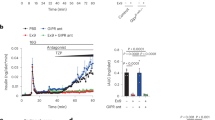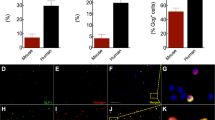Abstract
OBJECTIVE AND DESIGN: We have investigated the effect of enterostatin on insulin release by the perfused rat pancreas: (1) under conditions of prolonged fasting and (2) under beta cell stimulation by digestive insulinotropic piptides.
RESULTS: In pancreases from 24-h starved rats, the insulin response to glucose was reduced (∼75%) as compared to that observed in fed rats. This minimal response was abolished by 100 nM enterostatin. In fed rats, 100 nM enterostatin blocked the insulin output evoked by gastric inhibitory peptide (GIP) (∼75%) and by glucagon-like peptide-1 (GLP-1) (∼80%). Since both peptides exert their insulinotropic activity by activating the adenylate cyclase/cyclic AMP system, the interference of this pathway by enterostatin may be considered. Enterostatin (100 nM) did not modify the insulin responses to 26–33 fragment of cholecystokinin (CCK-8) and carbachol, substances which activate phosphoinositol turnover within the beta cell. The inhibitory effect of 100 nM enterostatin on glucose-induced insulin release was also observed at 50 nM and 10 nM enterostatin. Finally, des-Arg-enterostatin (100 nM) did not modify glucose-induced insulin output.
CONCLUSION: Enterostatin inhibits the insulin response to glucose — both under fed and fasted conditions, and to the main digestive insulinotropic peptides — GIP and GLP-I. The entire enterostatic molecule seems to be necessary for it to exert its beta cell blocking effect. While the physiological role of enterostatin has not as yet been established, our observations allow speculation as to whether this peptide is implicated in the entero-insular axis as an anti-incretin agent.
This is a preview of subscription content, access via your institution
Access options
Subscribe to this journal
Receive 12 print issues and online access
$259.00 per year
only $21.58 per issue
Buy this article
- Purchase on Springer Link
- Instant access to full article PDF
Prices may be subject to local taxes which are calculated during checkout
Similar content being viewed by others
Author information
Authors and Affiliations
Corresponding author
Rights and permissions
About this article
Cite this article
Rodríguez-Gallardo, J., Silvestre, R. & Marco, J. Inhibitory effect of enterostatin on the beta cell response to digestive insulinotropic peptides. Int J Obes 23, 787–792 (1999). https://doi.org/10.1038/sj.ijo.0800927
Received:
Revised:
Accepted:
Published:
Issue Date:
DOI: https://doi.org/10.1038/sj.ijo.0800927
Keywords
This article is cited by
-
Plasma Enterostatin: Identification and Release in Rats in Response to a Meal
Obesity Research (2002)



